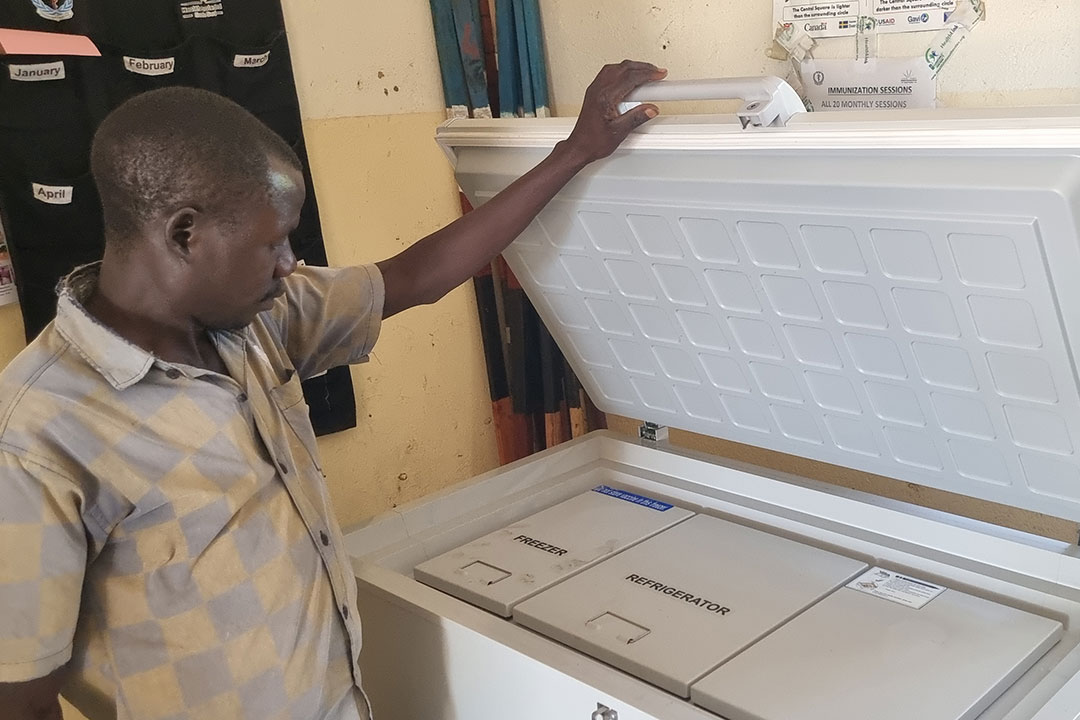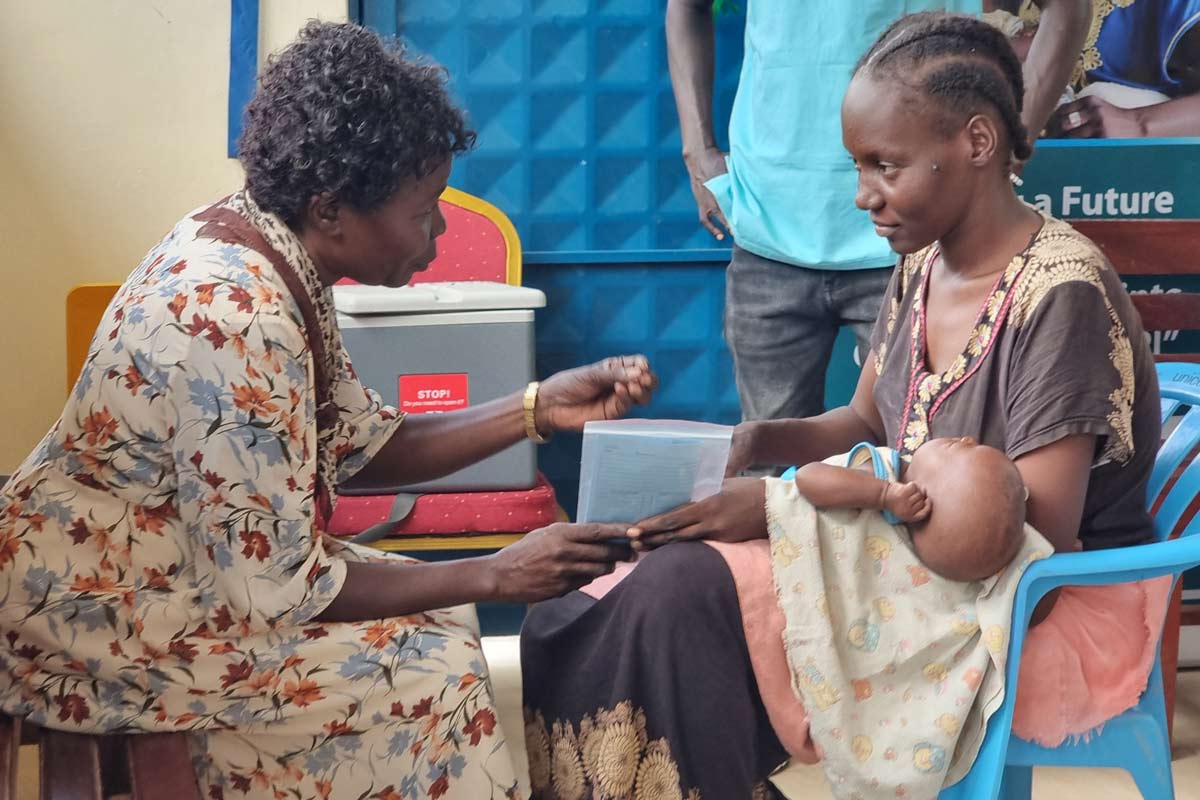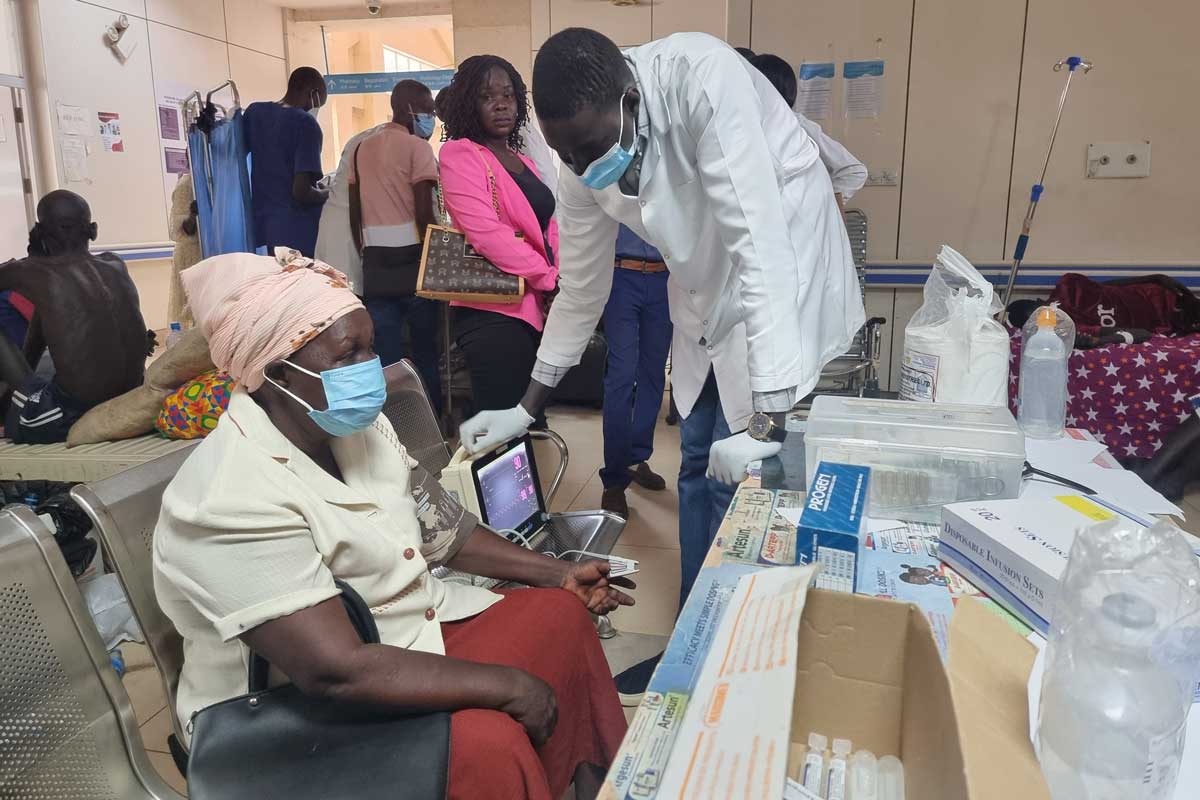How South Sudan keeps vaccines cool, from the airport all the way to arms
Maintaining an unbroken cold chain in the world’s least electrified country – which also happens to record ambient temperatures in the 30s and 40s Celsius for much of the year – is no walk in the park. Winnie Cirino goes deep on how South Sudan does it.
- 7 June 2024
- 8 min read
- by Winnie Cirino
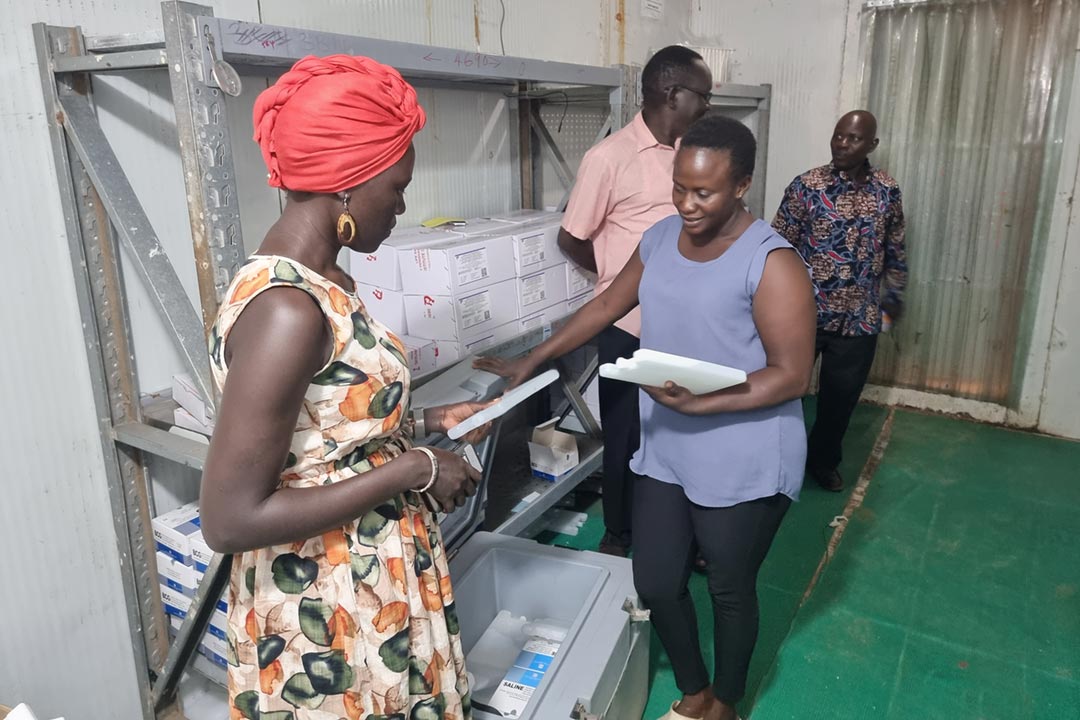
It's the world's least-electrified country, with dry-season temperatures tipping periodically into the 40s. There can't be many places in which the immunisation cold chain – the global web of fridges and cool-boxes that keeps vaccines in the all-important 2–8°C temperature range, from the manufacturer all the way to the furthest village – is more challenging to maintain.
"We need to expand the vaccine store to accommodate more vaccines and establish cold chains with negative [temperature] storage for vaccines requiring different temperatures."
– Dr Atem Nathan, Director General for Primary Health Care at the Ministry of Health
And yet, South Sudan has managed to get vaccines to progressively more of its children each year since 2016, reaching 76% of children with at least one jab in 2022. How does it work?
Mapping vaccine pathways
Each September, the Ministry of Health's Logistic Working Group meets to develop its immunisation forecast for the coming year. The forecast is the blueprint, informing the shipment plan and detailing how vaccine doses will be transported both into the country, and then across it.
Vaccines are procured via support from Gavi, the Vaccine Alliance, often with contributions from the South Sudanese government and with help from other partners, such as UNICEF.
"The vaccines are cleared from the airport and moved into the National Vaccine Store," explains Victor Sule, Immunization Manager with UNICEF. "Records are taken after inspection, and the reports of vaccine arrival are made. Then the vaccine is stored at the National Vaccine Store where there are working cold rooms, working freezer rooms for bulky vaccine storage in Konyokonyo [in Juba]."
At Konyokonyo – the national hub
In Konyokonyo, two pharmacists handle vaccine approvals, while two technicians manage technical operations. Dr Atem Nathan, Director General for Primary Health Care at the Ministry of Health describes the facility:
"There are four cold chain rooms, each measuring about three by two metres, equipped with remote monitors connected to a central monitoring unit. These monitors can also send alarms to technicians' phones."
Dr Nathan says an outstanding challenge is transporting vaccines from the airport to the vaccine store. "We don't have a dedicated vehicle for vaccine transport. Sometimes, vaccines remain on the airport tarmac and awaiting available transport."
The vaccines are well-insulated, and the Konyokonyo team always finds a staff member willing to sacrifice a vehicle to pick up the vaccines, but Dr Nathan stresses that a refrigerated vehicle would help shore up this wobbly link in the chain. Noted Patience Musanhu, who leads Gavi's South Sudan team, "Gavi has reserved a budget to procure tailored vaccine distribution trucks, and we are hoping this will ease some of the challenges that the country is currently facing."
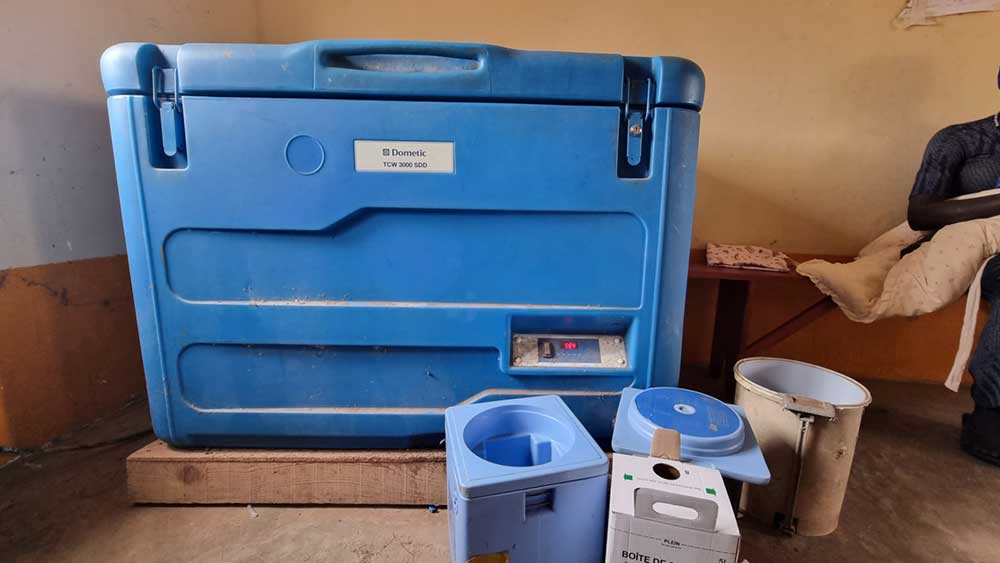
Credit: Winnie Cirino
With plans to introduce more vaccines in future, South Sudan's current vaccine store's capacity is another point of concern for Dr Nathan. "We need to expand the vaccine store to accommodate more vaccines and establish cold chains with negative [temperature] storage for vaccines requiring different temperatures," he notes. The majority of vaccines need to be maintained at a standard fridge temperature of 2–8°C, but some vaccines require "ultra-cold" temperatures. South Sudan was unable to roll out the Pfizer COVID-19 vaccine due to these storage limitations, Dr Nathan points out.
Keeping a close eye
Still, South Sudan, a country that gained its independence just over a decade ago, has come a long way in bolstering its vaccination system – not least by building out the cold chain with innovative tools.
Cold chain technician Anthony Lomoro attests to the transformative impact of advanced monitoring devices such as the BeyondWireless remote temperature monitoring system. These are particularly vital at the national hub, through which every dose of vaccine passes. Problems here would create problems countrywide.
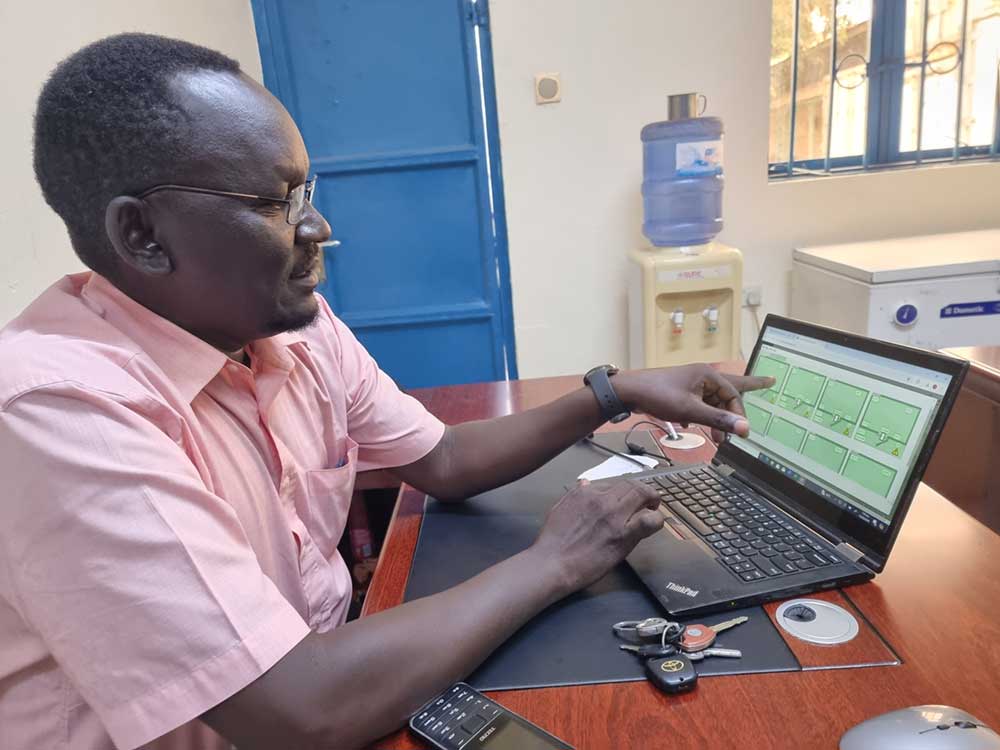
Credit: Winnie Cirino
"These devices have improved our work by 90%," Lomoro declares. Previously, Lomoro would undertake multiple daily trips to the cold chain rooms, manually checking temperatures with a digital thermometer stationed in each room. With the new, more intelligent tools, he can remotely access crucial data.
"I no longer need to physically enter the cold rooms. Instead, I can simply log into the computer, which provides all information on room numbers, sensor status, temperatures and alerts for faults in specific areas," Lomoro explains.
Instances such as unintentionally leaving doors open or technical malfunctions like power outages are swiftly addressed through instant notifications on Lomoro's phone. "I receive alerts immediately in my phone indicating if systems are offline due to power issues or if doors are left open. This makes it easy for me to immediately identify and address issues even when I have returned home, after work," he emphasises.
Kinks in the chain
Labour-saving tools are especially impactful because the national cold chain is rather short-staffed, relying on just two technicians, who also support state and county centres, complicating rapid response.
Furthermore, natural disasters such as floods, lack of enough storage capacity and equipment maintenance, as well as spare parts sometimes affect operations.
"We try our best to avoid any breakdown by maintaining back-up cold chain facilities. If it comes to the worst, we redirect vaccines to state stores," Lomoro reveals.
From state stores, to county fridges, to arms
Every quarter, vaccines are distributed to South Sudan's states, based on end-of-quarter reports on their stocks. For the 37 counties that are not reachable from state-level distribution due to poor roads or insecurity, vaccines are airdropped from the national level. While airdropping vaccines increases access in hard to reach areas, it also drives the cost of doing business in South Sudan.
From the state level, vaccines are distributed monthly to county cold chain points. "At the county[-level] cold store, we have solar direct drive refrigerators for vaccines, so that the vaccines are kept well," explains Sule. Powering fridges from the sun bypasses reliance on an electrical grid that is threadbare in places, and unreliable in general.
He adds that from the county level, vaccines are also distributed monthly to health facilities or delivery points where children get vaccinated.
Periodically, health facilitators travel to communities to conduct outreach, reaching children who missed vaccinations because they did not visit the nearest health facility, or live far away. To do this, vaccinators use special passive containers designed to maintain the vaccines at the right temperatures.
"There is what we call a ‘vaccine carrier'. Those are also part of the cold chain equipment we use to transport vaccines from community to community with the help of ice packs, ensuring that children are vaccinated," Sule notes.
Have you read?
Should a cold box fail at keeping the vaccine safe, health workers are alerted by a sticker – vaccine vial monitors (VVM), heat-sensitive labels on the vaccine's packaging. "If the vaccine vial monitor changes colour, it means the vaccine has been exposed to heat outside the recommended temperature," says Sule.
"There is a point where the colour indicates a ‘discard point', meaning the vaccine cannot be used. If the vaccine maintains a certain level, indicating that the vaccine hasn't been exposed to excessive heat, it can be used."
This method helps health professionals ensure that the cold chain is not compromised during transportation or storage in fridge stores.
Sunshine for keeping cool
South Sudan is hot. Just this March, schools across the country closed as temperature forecasts warned of 45°C highs.
Hotter temperatures cause heat-sensitive vaccines to lose potency faster, but according to Sule, this is rare because, in general, the cold chain functions well. Moreover, most of South Sudan's cold chain is powered by that burning sun.
Seventy-nine out of 80 cold stores in South Sudan have so far been equipped with solar direct drive (SDD) fridges, with Bor county awaiting repair after a recent fire damaged health centre infrastructure. Dr Nathan emphasises that the Ministry continues to prioritise new installations in different locations based on the need.

Credit: Winnie Cirino
"Every state now has a state cold chain with fridges, and in the future, we aim to equip them with cold rooms to increase capacity. We are also installing solar fridges in high priority areas," Nathan notes, adding that they trained more than 120 cold chain assistants to handle minor errors with the solar refrigerators.
Did you know?
Gavi's work doesn't end at the vaccine – it ends at the point of vaccination. That means helping countries shore up their means of getting vaccines safely from here to there.
In South Sudan, Gavi support has provided more than 3,800 cold chain units since 2018, equipping the state, county and health facility level.
What does that mean in practical terms? Since 2019, Gavi's support to South Sudan's cold chain has enabled the vaccination of 1,126,723 children with three doses of the pentavalent vaccine, and 1,077,579 children with the measles vaccine.
In 2023, Gavi helped train 33 Ministry of Health staff at state and county level in cold chain management.
New cold chain units – fridges and cold boxes – being linked into the sprawling infrastructural network in 2024 alone will add 9,092 litres of available vaccine storage capacity at health facility level.
Sule also emphasises that elsewhere solarisation has been a worthwhile investment. "The innovation of solar direct drive [fridge and freezer technology] that the country has invested into with the support of Gavi and other donors, has helped to ensure the integrity of vaccines used in the system. There is no fear of breakdown or vaccine exposure to heat because there is no power for storage," he says.
He commends the focus on solar refrigerators supported by Gavi and other partners. The near-constant sunshine makes for a reliable power supply in hot countries like this one, he says.
More innvoations
There are other improvements afoot. Sule mentions that more than 13 people have been trained on a recently introduced electronic stock management system. "This system connects transactions at the sub-national level with the national level, allowing the national manager to view the stock situation at different levels."
To improve oversight of vaccine stocks, health professionals use WhatsApp to collect data from the county levels at the end of each month,
"From the state and county, they are beginning to submit data and sometimes we have as much as 98% submission on every month," Sule says. This paperless process has improved the rate at which stock-outs can be remedied.
"The speed of information gathering is improved because of the innovation, because through the WhatsApp gathering of information, by the first week of every month, you have gotten the stocks of every level and that helps to inform quick decision if there is stock-out reported anywhere," he explains.
